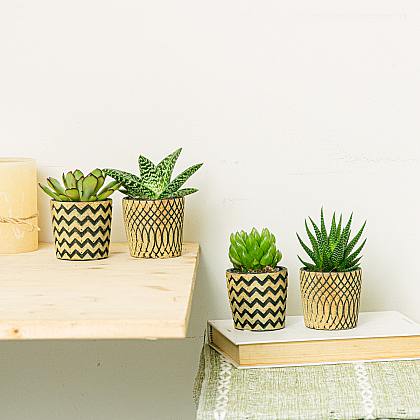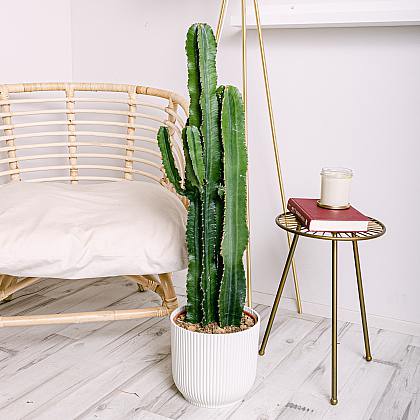Plant care in winter: tips and tricks for healthy leaves and proper watering
When winter comes, we need to take care not only of ourselves, but also of our beloved houseplants. But don't worry, with a few simple tips and tricks, we can...
When winter comes, we need to take care not only of ourselves, but also of our beloved houseplants. But don't worry, with a few simple tips and tricks, we can make sure our green friends stay healthy and happy. In this article, you'll learn how to properly care for your plants in winter. From proper watering, to protection from the cold and drought, to the best locations for houseplants, you'll find all the information you need to get your plants through the cold season. So grab your watering can and let's get started!
Winter challenges for houseplants
Winter challenges for houseplants can be really tough. It is as if the plants are suddenly transported to an icy and dry desert. The low temperatures and low humidity make it difficult for them to stay healthy. Some plants struggle to survive, while others simply give up and drop their leaves. It's heartbreaking to see your green friends suffer like this. But there is hope! There are a few tricks to help them through the winter. One of the most important things is to keep an eye on irrigation. In winter, houseplants require less water than in summer. It is important to find the right time to water and not to give too much or too little. A good rule of thumb is to let the soil dry slightly before watering again. Another problem in winter is the cold. Some plants can handle it, but others need extra protection. It is advisable to keep them away from cold sources of drafts and, if necessary, cover them with insulation. With a little attention and love, we can get our houseplants through the winter challenges and make sure they stay healthy and happy.
The importance of proper watering in winter
In winter, proper watering for houseplants is crucial. During this cold season, plants have different water requirements than in summer. It's important to find the right balance to keep them healthy and happy. If we water too much, the roots can rot and the plant can die. On the other hand, if we water too little, the leaves can wilt and turn brown. It's a real tightrope act!
To ensure proper irrigation, we should first familiarize ourselves with the individual needs of our plants. Some plants need more water than others, so we should consider their specific requirements. We should also make sure that the pot has enough drainage holes to allow excess water to drain away.
A good tip is to stick your finger in the soil to see if it's dry or not. When the top layer is dry to the touch, it's time to water. But be careful! In winter, it takes longer for the soil to dry, so we should be patient and not water too often.
It is also important to adjust the irrigation water. Cold tap water can damage the roots, so it's a good idea to bring it to room temperature beforehand. Alternatively, we can use rainwater if available.
Proper watering in winter is an art in itself. It requires attention and sensitivity, but if we do it right, our houseplants will reward us with healthy and green leaves. So let's get our watering cans ready and give the plants the love they deserve!
Protective measures against cold and drought
When the cold winter air arrives, houseplants need extra protection to ward off cold and drought. A simple protective measure is to place the plants away from cold draughts such as windows and doors. These can cause damage to plants and lead to drought. To increase the humidity in the air, you can also place a bowl of water next to the plants or spray them regularly with a mist. This helps maintain humidity and prevents the leaves from drying out. Another important aspect is to reduce the amount of irrigation in winter. Since most houseplants are dormant during this time of year, they require less water than during the warmer months. Therefore, it is advisable to reduce the frequency of watering and make sure that the pot ball can dry well between waterings. It is also important to protect the plants from frost by keeping them away from cold window panes or, if necessary, covering them with a fleece or blanket. By taking these simple precautions, we can ensure that our houseplants get through the winter healthy and strong, and that they bloom full of life again in the spring.
The secret to healthy leaves in winter
The secret to healthy leaves in winter lies in the proper care and attention we give to our houseplants. During this cold season, they are particularly sensitive and require special care to keep their leaves healthy and green. One of the most important measures is proper irrigation. In winter, we should be careful not to water our plants too much, as the roots can absorb less water at low temperatures. At the same time, however, we must not let them dry out. A good tip is to regularly check the plant's moisture needs by feeling your finger into the soil. When it feels dry, it's time to water. In addition to watering, it is also important to ensure the right temperature and humidity for the plants. Houseplants don't like it too warm or too dry. A slightly cooler location with sufficient humidity is ideal for your health. In addition, we should protect our plants from drafts and sudden changes in temperature, as these can cause stress. By taking care of our houseplants and giving them proper care, we can ensure that their leaves remain healthy and radiant even in winter.
The best locations for houseplants during the cold season
During the cold winter months, it can be difficult for houseplants to find the right location. However, with a few simple tips, you can keep your green roommates healthy and happy. A good location for houseplants during the cold season is near windows. This is where the plants get most of the daylight they need to grow and thrive. However, make sure that the plants are not placed directly at the windows, as the cold could harm them. Instead, place them a little further away and rotate them regularly so that all sides are evenly lit. Another good option is a room with a constant temperature. Avoid drafts and do not place the plants near radiators or other heat sources. This can cause the soil to dry out quickly and stress the plants. Keep in mind that each plant has different requirements, so research the specific needs of your houseplants. With the right choice of location, you can ensure that your houseplants remain healthy even during the cold season and let their beauty shine in your home.
Care tips for special plant species in winter
Care tips for special plant species in winter
Winter can be a real challenge for many plants, especially certain plant species. It is important that we give them the right care and attention to ensure that they remain healthy and happy. Some plant species require special care during the cold season. For example, succulents and cacti should be kept in a cooler room as they prefer lower temperatures. Remember to water them sparingly, as their water needs are lower in winter.
Orchids are also delicate plants and require special care during the winter. Make sure they are in a bright place, but not directly exposed to sunlight. Watering should be done carefully - excess water can lead to root rot.
For houseplants such as ferns or philodendrons, it is important to maintain humidity. Place a bowl of water next to the plant or spray water regularly on its leaves. This helps them maintain the right level of moisture.
Keep in mind that each plant has different needs. Find out about the specific requirements of your plant species and adjust your care accordingly. With a little attention and love, we can ensure that our plants survive the winter well and bloom healthily in the spring.
Overwintering tips for balcony and garden plants
When winter comes, we need to protect not only our houseplants, but also our balcony and garden plants. It can be a challenge to get them through the cold months, but with a few simple overwintering tips, we can make sure they're healthy and blooming again in the spring. An important measure is to protect the plants from frost. To do this, we can either take them to protected areas such as conservatories or greenhouses, or cover them with special protective covers. It is also important to adjust the irrigation. In winter, the plants need less water because they are less active during this time. Therefore, we should reduce watering and make sure that the soil dries out slightly between waterings. Another important overwintering measure is to protect the plants from strong temperature fluctuations. We can achieve this by placing them in sheltered locations, for example near walls or fences that can serve as natural sources of heat. Finally, we should regularly check for diseases or pests. If we act early, we can prevent problems from spreading and damaging our plants. With these simple overwintering tips, we can ensure that our balcony and garden plants survive the winter well and are full of life again next year.
Winter can be a difficult time for houseplants, but with the right care tips and tricks, you can ensure that your plants retain healthy leaves and are well watered. Remember to adjust the amount of watering and pay attention to the needs of your plants. Protect them from cold and drought by placing them in suitable locations and possibly taking extra measures. Also, pay attention to special care requirements of different plant species and take your time to properly overwinter balcony and garden plants. By following these tips, you can ensure that your plants survive the winter well and bloom again in full bloom in the spring. Perhaps it is also an opportunity to deepen your relationship with your plants and appreciate the beauty of nature even more. Because in the middle of the cold season, houseplants can give us warmth and joy


